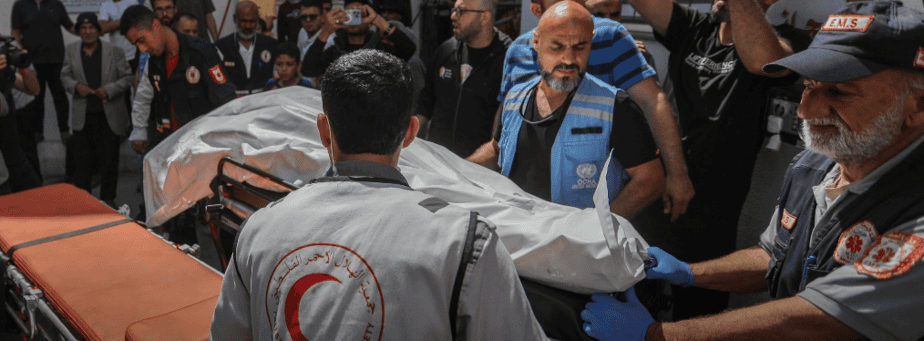Biden Calls for Immediate Cease-Fire in Gaza in Call With Israel’s Netanyahu

By Margherita Stancati, Gordon Lubold and Anat Peled
Updated April 4, 2024 1:55 pm ET
WASHINGTON—President Biden called Thursday for an immediate cease-fire in Gaza during a phone conversation with Israeli Prime Minister Benjamin Netanyahu, the White House said, days after the killings of seven aid workers in Gaza unlocked a firestorm of global criticism over Israel’s conduct in the war.
Netanyahu and other Israeli officials have rushed to apologize for the deadly strike on the World Central Kitchen aid convoy Monday. But the White House and the group’s founder, José Andrés, are intensifying pressure on Israel to allow more humanitarian aid into Gaza and take steps to safeguard noncombatants. The White House said that Biden and Netanyahu discussed “the latest developments in Israel and Gaza.”
Israel has said its forces misidentified vehicles carrying the aid workers as hostile targets and struck them. The killings prompted questions about the effectiveness of the mechanism used by the Israeli military to keep humanitarian workers out of harm’s way on the battlefield. In response to the incident, the Israeli military said it was changing the way it coordinates with aid groups on the ground.
Biden has condemned the strikes on World Central Kitchen, a Washington-based charity, and urged Israel to complete its probe quickly. The president has repeatedly criticized Israel as not doing enough to ensure the safety of civilians in Gaza, including humanitarian workers who are providing lifesaving aid to the local population. He has also warned Netanyahu against an offensive in Rafah without a credible plan to keep the civilian population safe, which U.S. officials say Israel hasn’t presented.
The World Central Kitchen strikes have also intensified calls from congressional critics for Biden to take a tougher line with Netanyahu. Some Democrats have demanded that Israel do more to protect civilians and insisted that the White House back more conditions on aid, a stance that could complicate passage in the House of a $95 billion aid bill that includes funding for Israel as well as Ukraine and Taiwan. About 20 Democrats are expected to oppose the House bill because of their concerns about the war, House Democratic aides predict.
Most lawmakers have signaled no public shift in their broad support of Israel in recent days, but there were signs that could change in coming weeks. Sen. Chris Coons (D., Del.) said Thursday that if Netanyahu were to launch a full-scale invasion of Rafah with no humanitarian provisions, he would vote to put conditions on aid to Israel. But that remains a minority position, even among Democrats critical of Netanyahu.
Whether the World Central Kitchen incident produces a profound shift in the dynamic between the U.S. and Israel over the war remains to be seen. Biden has previously signaled that he wouldn’t halt arms shipments to Israel and has said U.S. support for the country in its defense against Hamas is unflinching.
This week, the Biden administration authorized the transfer to Israel of over 1,000 500-pound bombs and over 1,000 small-diameter bombs, U.S. officials said.
The approval happened hours before Monday’s attack, the officials said. Afterward, the president said in a statement that he was “outraged and heartbroken” by the Israeli airstrike. The weapons are expected to be delivered early next year, though the U.S. could decide to suspend the delivery, the officials said. CNN earlier reported on the approval.
The president isn’t expected to impose restrictions on providing Israel weapons or place limitations on how Israel uses them, a U.S. official said.
The southern Gaza city of Khan Younis, seen from nearby Rafah, comes under Israeli bombardment. PHOTO: SAID KHATIB/AGENCE FRANCE-PRESSE/GETTY IMAGES
Injured Palestinians receive treatment at a hospital in Deir al-Balah, Gaza. PHOTO: AGENCE FRANCE-PRESSE/GETTY IMAGES
The findings of an Israeli investigation into the strikes on World Central Kitchen employees in Gaza were presented to the military’s chief of staff on Thursday and are currently being presented to the minister of defense and the prime minister, according to Israeli military spokesman Rear Adm. Daniel Hagari.
“I believe that after we show it to the ambassadors from the relevant countries and to the people of the WCK we will publish it clearly and transparently to the public and this will happen soon,” Hagari said in a statement on Thursday.
Hagari called the aid group “a devoted organization that came to do good, came to bring food to those who need it in Gaza.”
Andrés, the founder of the charity, has called for a wider probe. Andrés said he asked the governments of those killed to join his organization in demanding a third-party investigation into whether the attacks violated international law.
“An independent investigation is the only way to determine the truth of what happened, ensure transparency and accountability for those responsible, and prevent future attacks on humanitarian aid workers,” he said on Thursday.
Andrés, who said Wednesday that the convoy was “targeted systematically, car by car,” asked the Israeli government to preserve all communications and documents relevant to the strikes to assist in the investigation. When asked whether Israel would cooperate, a senior Israeli government official said that Israeli authorities were conducting their own, thorough investigation and that they would make the findings public.
Israel Blames Misidentification for Strike That Killed Gaza Aid Workers
YOU MAY ALSO LIKE
Israel Blames Misidentification for Strike That Killed Gaza Aid Workers
Play video: Israel Blames Misidentification for Strike That Killed Gaza Aid Workers
The Israeli military’s initial investigation into a strike in Gaza that killed World Central Kitchen aid workers found a mistake in identifying a target was to blame. Photo: Mohammed Saber/Shutterstock
The strikes resulted in the first known deaths of foreign aid workers in Gaza since the start of the war. The victims were a Palestinian, a Pole, an Australian, a dual U.S.-Canadian citizen and three British security advisers. Their deaths were condemned by Western leaders who voiced frustration with Israel’s inability to contain the civilian toll of its war against Hamas.
For Biden, voter dissatisfaction with his handling of the Gaza war is a growing concern. Antiwar sentiment in the U.S. has shown up in Democratic primary contests, including one this week in Wisconsin where roughly 48,000, or 8.3%, voted “uninstructed” instead of casting their ballots for a candidate. Those results came after a robust effort by antiwar activists urging the state’s voters to register discontent with Biden by making that selection. Four years ago, just 3,500, or 0.4%, selected “uninstructed,” in the Wisconsin primary.
Biden won Wisconsin by about 20,000 votes in 2020, meaning that current dissatisfaction with the president could have significant consequences in November’s election. Wisconsin is one of a handful of states expected to determine the outcome of the presidential election.
The results in Wisconsin are similar to Democratic primary contests this year in places such as Minnesota and Michigan where voters could protest with an alternative selection. In Minnesota, nearly 46,000, or 19%, voted uncommitted. In Michigan—another swing state—over 100,000 voters, or 13.2%, voted uncommitted.
Separately, in a sign that Israel is bracing for an Iranian response to the killing of senior Iranian military officials in Damascus on Monday, Israel’s military said this week it was calling up reservists to bolster air defenses and on Thursday said it was pausing leave for all combat soldiers.
The World Central Kitchen incident has added to questions about Israel’s conduct of the war in Gaza—and how an operation in Rafah could play out. Defense Secretary Lloyd Austin addressed that issue late Wednesday with his Israeli counterpart, Yoav Gallant.
“This tragedy reinforced the expressed concern over a potential Israeli military operation in Rafah, specifically focusing on the need to ensure the evacuation of Palestinian civilians and the flow of humanitarian aid,” Austin said, according to a U.S. statement on the meeting.
Israel’s planned ground offensive in Rafah, on the southern border with Egypt, is a significant point of tension between the U.S. and Israel. Israel considers Rafah the last major bastion of Hamas in Gaza, and believes clearing it is essential to achieving its goal of defeating the militants.
But the U.S., its Western allies and aid groups warn that a military operation in Rafah could have devastating consequences for the already-dire humanitarian situation in Gaza. More than half of the enclave’s population is estimated to be sheltering in the city after escaping the fighting further north. Rafah is the hub for humanitarian operations in all of Gaza. Food and other essential items enter through Rafah, and it is there that United Nations agencies and aid groups are now based.
The aid workers killed in the Israeli strike were, top row, Damian Soból of Poland and Zomi Frankcom of Australia; middle row, John Chapman, Jim Henderson and James Kirby of the U.K.; and bottom row, Saifeddin Issam Ayad Abutaha, a Palestinian, and Jacob Flickinger, a dual U.S.-Canadian citizen.
WORLD CENTRAL KITCHEN/REUTERS (5), WORLD CENTRAL KITCHEN/AFP/GETTY IMAGES 2)
World Central Kitchen, like other aid groups working in Gaza, seeks security guarantees from all parties to the conflict. The aid groups share the locations of their guesthouses and other facilities with the Israeli military, and have coordinated their movements with them through Cogat, the military’s civil-administration body.
The Israeli military said after the incident on Monday that it was taking over direct coordination with international aid organizations from Cogat.
Since the start of the war, more than 33,000 people have been killed in Gaza, most of them women and children, Palestinian health authorities said Thursday. The official Palestinian figure doesn’t distinguish between civilians and combatants. Israel says around 1,200 people, most of them civilians, were killed and 240 kidnapped in the Hamas-led attack that triggered the war on Oct. 7. Some 130 Israeli hostages are still captive in Gaza, including the bodies of some who were killed.
The fallout from the strikes is hindering the humanitarian response in Gaza, where the majority of its 2.2 million people are desperately hungry, displaced and without access to medical care. World Central Kitchen, one of the main providers of food to Gazans, suspended its operations in the enclave following the attacks, as have other aid groups.
Despite international outrage at the strikes and an unprecedented apology and statements from politicians in Israel, the incident hasn’t catalyzed a domestic backlash against the military, and support for the armed forces remains high.
The strikes, which are viewed in Israel as a tragic wartime mistake, have had little influence on Netanyahu domestically, said Gayil Talshir, a political scientist at the Hebrew University of Jerusalem. But they do add to mounting international pressure on Netanyahu from both the U.S. and other countries, she said.
Netanyahu is also facing domestic political pushback over his handling of the war and failure to secure the release of the remaining hostages held in Gaza. His approval ratings have plummeted since the Oct. 7 attack.
Palestinians search through rubble in Rafah, which is bracing for a planned ground offensive. PHOTO: HAITHAM IMAD/SHUTTERSTOCK
The number of people killed in Gaza during the war has passed 33,000, according to Palestinian health authorities. PHOTO: AHMAD HASABALLAH/GETTY IMAGES
Tens of thousands of protesters took to the streets of Jerusalem this week in the largest antigovernment protests since the start of the war, joined by some hostage families who say Netanyahu isn’t doing enough to reach a cease-fire deal with Hamas that would set their relatives free.
At the same time, the Israeli leader is under pressure from his right-wing allies, who oppose such a deal since it would require Israel to release a large number of Palestinian prisoners, some of whom are charged with murdering Israelis.
A bill that expands the criteria for military service but continues to exempt the ultraorthodox community is also on the list of grievances that some Israelis have against their prime minister. Netanyahu depends on the support of the ultraorthodox members of his coalition to stay in power.
But the proposed legislation is fueling anger over how the burden of the war is distributed. Benny Gantz, a secular member of Netanyahu’s unity government, is threatening to pull out if the bill passes into law.
Gantz, one of Netanyahu’s chief political rivals, called on Wednesday for early elections in September, a request the prime minister’s right-wing Likud party promptly rejected. Unless the government falls, the next legislative elections are slated for October 2026.
“There is a very significant threat both in the streets and inside the Knesset,” said Talshir. “The rope is tightening around Netanyahu’s neck.”
—Dov Lieber contributed to this article.
Write to Margherita Stancati at margherita.stancati@wsj.com and Gordon Lubold at gordon.lubold@wsj.com
Conflict in the Middle East
Latest news and key analysis, selected by editors
Protest Movement Re-Emerges With Focus on Ousting Netanyahu
Protest Movement Re-Emerges With Focus on Ousting Netanyahu
The Chef Who Beat the U.S. Military at Getting Aid Into Gaza
The Chef Who Beat the U.S. Military at Getting Aid Into Gaza
U.S. and Israel’s Intelligence Sharing Draws Criticism
U.S. and Israel’s Intelligence Sharing Draws Criticism
Inside the Tunnels That Conceal Hostages and Hamas’s Leaders
Inside the Tunnels That Conceal Hostages and Hamas’s Leaders
The Backroom Dealer Steering Iran’s ‘Axis of Resistance’
The Backroom Dealer Steering Iran’s ‘Axis of Resistance’
Murder, Sexual Violence and Torture on Oct. 7
Murder, Sexual Violence and Torture on Oct. 7
The Ruined Landscape of Gaza
The Ruined Landscape of Gaza
Here’s What We Know About the Hostages Hamas Took
Here’s What We Know About the Hostages Hamas Took
Copyright ©2024 Dow Jones & Company, Inc. All Rights Reserved. 87990cbe856818d5eddac44c7b1cdeb8
HIDE CONVERSATION (0)
Conversation
By joining the conversation you are accepting our community rules and terms. To view rules, terms and FAQs, click here. Questions can be sent to moderator@wsj.com.
Conversations on news articles and news columns must be kept on the topic of the story. In opinion content, conversations can delve into other subjects. The conversation will close on this article four days after publication.
Be the first to comment…
2 People typing
Sort by
Newest


